| Srl | Item |
| 1 |
ID:
132883
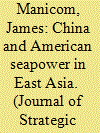

|
|
|
|
|
| Publication |
2014.
|
| Summary/Abstract |
Debates about the future of American seapower in East Asia turn on the argument that American seapower presents a risky and costly luxury that undercuts the cooperative potential of US-China relations. This article asks whether accommodation between China and the United States on the possession and exercise of American seapower in East Asia is possible. Accommodation on this front could significantly lower the risks of unintended escalation and in turn undermine arguments that favour an American retreat from East Asia. The article outlines how accommodation can be achieved on the exercise of American seapower in the region.
|
|
|
|
|
|
|
|
|
|
|
|
|
|
|
|
| 2 |
ID:
134008
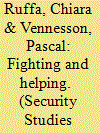

|
|
|
|
|
| Publication |
2014.
|
| Summary/Abstract |
In complex humanitarian emergencies, why are NGO-military relations cooperative in some cases, yet deeply conflictual in others? Drawing on historical-institutionalist theoretical insights, we argue that NGOs and military organizations are embedded in, and responding to, domestic institutional configurations that define a set of political incentives and constraints, material and normative, which structures and influences the characteristics and outcomes of their relations. Counterarguments suggest that organizational differences and the nature of their missions affect NGO-military relations. Using fresh empirical evidence we assess these arguments by comparing the Italian and the French experiences of NGO-military relations during the NATO-led International Security Assistance Force (ISAF) mission in Afghanistan and the UN mission in Lebanon (UNIFIL II) between 2007 and 2011.We find that domestic institutional configurations are not left behind when NGOs and military units deploy abroad. Rather, they shape NGOs' and militaries' capacity to work together instead of at cross purposes and ultimately influence the success of international action.
|
|
|
|
|
|
|
|
|
|
|
|
|
|
|
|
| 3 |
ID:
133367
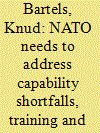

|
|
|
|
|
| Publication |
2014.
|
| Summary/Abstract |
Given the proximity of the summit and preceding ministerial meetings, the significance of recent events in Ukraine and the shift in NATO's posture from being engaged in operations to being prepared for operations, this gathering has been extremely important for us.
|
|
|
|
|
|
|
|
|
|
|
|
|
|
|
|
| 4 |
ID:
131781
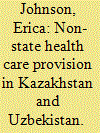

|
|
|
|
|
| Publication |
2014.
|
| Summary/Abstract |
Drawing on comparisons with cooperative and competitive non-state health care provision around the world, this article analyses non-state provision of health services in post-Soviet Uzbekistan and Kazakhstan. It explores the conditions in which non-state provisions remain cooperative or become politicised and contrasts the relations between NGOs and the state in Uzbekistan and Kazakhstan and the way they became politicised in the Middle East. In contrast to Western conceptions of NGOs, Central Asia's health NGOs cooperate with state agencies to serve their constituencies. In contrast to the perceptions of Central Asian governments, health-oriented NGOs do not aim to politicise health care. Donor support to Central Asia's health NGOs has created civically oriented actors that fill gaps in the state's capacity and enable governments to better serve their populations.
|
|
|
|
|
|
|
|
|
|
|
|
|
|
|
|
| 5 |
ID:
134101
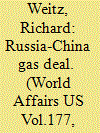

|
|
|
|
|
| Publication |
2014.
|
| Summary/Abstract |
Until recently, inadequate transportation infrastructure, along with rancorous arguments about price and a general atmosphere of mutual suspicion have kept Chinese purchases of Russian energy at relatively low levels. But now, with the historic May 21st agreement, the China National Petroleum Corporation (CNPC), the country's largest integrated energy company, and Russian energy giant Gazprom, which controls Russia's export gas pipelines, finally signed a thirty-year, $400 billion deal that will see as much as thirty-eight billion cubic meters (bcm) of Russian gas go to China annually from around 2018 to 2047. Gazprom will send gas pumped from its Kovyktin and Chayandin fields in eastern Siberia to the Beijing-Tianjin-Hebei metropolitan area in the north of China and the Yangtze River Delta in the east. The deliveries, which may take a few years to reach full capacity, will provide China with more than one-fifth of its present-day annual consumption of some one hundred and seventy bcm, although Chinese demand for natural gas is expected to rise above two hundred bcm by then.
|
|
|
|
|
|
|
|
|
|
|
|
|
|
|
|